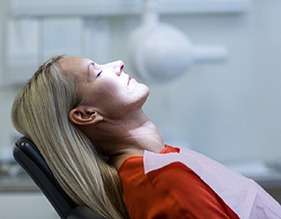Sedation Dentistry – Edison, NJ
We Make Your Treatments Easy and Comfortable
Millions of Americans struggle to get the dental services they need all because they are too afraid to sit in the dental chair for long periods of time or even visit the dentist to begin with. Thankfully, Dr. Shah is an expert in helping patients get comfortable, both with sedation services and with the help of his caring and accommodating team members. No matter how simple or complicated you may believe your dental needs might be, Signature Smiles at Edison can make you feel prepared for your next treatment with relaxing sedation dentistry!
Why Choose Signature Smiles at Edison for Sedation Dentistry?
- Dentist Certified in IV and Oral Conscious Sedation
- General Anesthesia (Sleep Dentistry) Available
- Comprehensive Patient Comfort Menu Provided
Oral Conscious Sedation

Those with more moderate cases of dental fear or anxiety can take advantage of oral conscious sedation, a sedative that comes in the form of a pill that is ingested well before the appointment begins. With the help of a friend or family member, you’ll be driven to the dental office and feel fully relaxed before any step of your treatment begins. While this sedative does not put you to sleep entirely, it does make it more difficult to remember your experience. You will need a ride home after your appointment so the effects have time to wear off.
What Is Oral Conscious Sedation?

Oral conscious sedation is usually recommended for adults who have anxiety, fear, or something else that makes them feel uneasy or uncomfortable in the dental chair. There aren’t any needs or face masks involved. Instead, you are prescribed a small pill to take about an hour before your appointment. By the time you get to the dental office, you will feel perfectly relaxed.
How Does Oral Conscious Sedation Work?

Once the effects of the medication kick in, you will feel deeply relaxed. Some patients don’t even remember their visit. However, you will remain conscious throughout the whole treatment, so you will still be able to answer questions and follow the instructions of your dentist. We will closely monitor your vital signs to ensure that you are safe. Unlike nitrous oxide sedation, the effects of oral conscious sedation linger, so you should arrange for a trusted friend or family member to take you to and from your treatment.
Are You a Good Candidate for Oral Conscious Sedation?

Oral conscious sedation is popular because it’s highly effective and doesn’t involve a mask or needle. You are likely a good candidate for oral conscious sedation if you:
- Have dental anxiety or phobia
- Regular cancel appointments due to fear
- Have a sensitive gag reflex
- Are having multiple procedures at once
- Have a long dental treatment
- Have difficulty sitting still
- Struggle to become numb from anesthesia
- Have had negative dental experiences in the past
Nitrous Oxide Dental Sedation

One of the most common forms of dental sedation available, nitrous oxide sedation is ideal for those with more mild cases of dental anxiety. Nitrous oxide is inhaled through a nasal mask that is worn by the patient throughout the entirety of treatment. This creates a warm sensation throughout the body, ensuring a relaxing treatment process from start to finish. Much like oral conscious sedation, you’ll still be awake to let Dr. Shah know if you need assistance or more sedative provided. You’ll even be able to continue your day as normal since the effects of the sedative only take a few minutes to wear off!
How Does Nitrous Oxide Work?

Before it’s used as a sedative, nitrous oxide is mixed with oxygen. It is then delivered through a mask placed over the nose. Nitrous oxide is called “laughing gas” based on the euphoric state it induces; your mind will be calm, and you won’t experience any pain, discomfort, or anxiety. Please bear in mind that nitrous oxide is not supposed to put you to sleep. It does cause you to enter an advanced state of relaxation, but you will still be conscious and able to follow directions or answer questions.
After the treatment, you’ll simply need to spend a few minutes breathing oxygen until the effects of the nitrous oxide wear off. At that point, you’ll be ready to drive home or back to work by yourself. You may find that you have little to no memory of the procedure itself; this is not uncommon, and it can be seen as a benefit for those bothered by the sights and sounds of a dental environment.
Who is a Candidate for Nitrous Oxide?

Nitrous oxide can be useful for overcoming several potential obstacles to dental care. We suggest it for patients who have:
- Mild or moderate fears or anxieties related to the dental office.
- A strong gag reflex that needs to be controlled during dental care.
- Trouble sitting still or holding their jaws open for an extended amount of time.
- Neck or back pain that can make lying down in the dental chair uncomfortable.
- Tooth sensitivity or jaw pain.
Pregnant women, glaucoma patients, and people with high blood pressure might not be good candidates for nitrous oxide sedation. Talk to Dr. Shah about your current medical conditions and health history so that we can confirm that you can safely receive nitrous oxide.
What is the Recovery Time?

Other forms of dental sedation can take several hours to fully recover from. Nitrous oxide is different as it doesn’t have any lingering side effects, so you won’t need to take time off work or have someone else pick you up; you just need to wait a few minutes. That said, there may be follow-up instructions for the treatment itself, which Dr. Shah will make sure that you’re well-informed of before you leave our office.
IV Sedation

A much stronger form of sedation, IV sedation is delivered directly into the veins through an IV. This makes it much easier to adjust the amount of sedative provided on the fly. IV sedation is meant for those with more severe anxiety and/or special needs. However, IV sedation does not put you to sleep entirely, even though some patients may find themselves falling asleep due to the high level of relaxation it provides. Following your treatment, you will need a friend or family member to drive you home. Allow for at least 12 hours to pass so the sedative can fully dissipate.
How IV Sedation Works

IV sedation is most commonly used to provide individuals with intense and extreme dental anxiety with an opportunity to experience a more relaxed and comfortable appointment. It is often recommended when a person is preparing for multiple procedures or extensive treatments and will be required to sit for a prolonged period.
When visiting our dental office, Dr. Shah will first determine if you are a qualified candidate for IV sedation. If so, you will have an IV placed in your hand or in the bend of your elbow, which will deliver the solution containing the sedative. It will enter into your bloodstream and begin to create a “sleep-like” feeling, allowing you to fully relax and remain comfortable throughout your appointment. During your procedure, our team will closely monitor your vitals and make any necessary adjustments along the way.
If you’re concerned about IV sedation putting you to sleep, you can be assured that you will remain cognizant of your surroundings and be able to respond to various cues from your dentist and the dental team.
Who is a Good Candidate for IV Sedation?

To determine if you are a qualified candidate for IV sedation, it is necessary that you meet with your sedation dentist in Edison, Dr. Shah. During this visit, he will go over your medical history as well as your current medications. If you require extensive treatments (i.e., root canal therapy, tooth extraction, dental implant placement) or suffer from extreme dental anxiety, there is a good chance you will be eligible for IV sedation. However, it is also necessary that we determine if you have any medical conditions or are taking medications that might cause complications as a result of receiving this type of sedative.
What to Expect After Receiving IV Sedation

Because IV sedation is administered into the bloodstream, it will take time for the effects to wear off after your visit. This is why we ask that you have someone escort you to and from your appointment. We also suggest this individual stay with you for a time to ensure that you experience no problems as the sedative slowly dissipates. It can be helpful to have this person with you should you need any help in the first 24 hours after your procedure.
When undergoing IV sedation, it is advised that you take the following day off of work to allow your body to fully rest.
General Anesthesiology (Sleep Dentistry)

With the help of an in-house anesthesiologist, we can provide an even stronger form of sedation that is typically only found in hospitals. This method, also known as sleep dentistry, works to put the patient into a deep form of sleep, making it ideal for those with extremely severe anxiety or special needs. This option is also ideal for those with a large number of treatments to complete, whether it’s reconstruction surgery or multiple root canals.
Sedation Dentistry FAQs
Is Sedation Dentistry Safe?
Sedation dentistry is not only approved by the American Dental Association, but it also has been clinically researched to ensure its safety. Plus, Dr. Shah underwent multiple years of training in intravenous sedation at Montefiore Hospital, making him uniquely qualified to administer treatment. Whether you need help relaxing during preventive, restorative, or cosmetic dental care, he will review your medical history in-depth to ensure you are a candidate. If you are, your vitals will be closely monitored throughout your procedure.
Can I Return to Work or School After My Procedure?
The answer depends on the sedation dentistry method in question. For example, the effects of nitrous oxide dissipate nearly instantaneously, allowing you to drive to and from your appointment. On the other hand, oral conscious sedation lingers, causing many patients to feel drowsy after their visit. Therefore, you will require a trusted adult to drive you to and from our office. We recommend taking the rest of the day off from work or school following your appointment.
Will I Feel Any Pain?
Thanks to local anesthesia, you will be completely numb as our dentist in Edison works on your teeth and gums. Plus, the simultaneous help of the sedation keeps fear and anxiety at bay, ensuring you can completely relax. When it’s time for you to head back home, we will provide you with an extensive list of aftercare instructions, including which foods to avoid, how to minimize swelling, and which over-the-counter medications are approved. Following these best practices will help you remain as comfortable as possible throughout the healing process.
Will I Be Aware of My Surroundings?
Nitrous oxide, oral conscious sedation, and IV sedation all are designed to put you into a deep state of relaxation while allowing you to remain aware of your surroundings. With that being said, the calming effects may cause you to doze off. Not to worry though! You’ll be easily awakened and able to respond throughout your procedure. The only exception is sleep dentistry, which means you’ll be in a deep form of sleep. Across the board, you can expect a mild to moderate amnesia effect. Not only does this make it difficult to remember your time in the treatment chair, but it helps relieve dental-related anxiety for future visits as well!
If you have spent months or years dreading your next dental appointment, it is important to know it doesn’t have to be that way! To have the anxiety-free, enjoyable dental experience you deserve, contact our office today and find out if sedation dentistry is right for you.
Does Nitrous Oxide Come with Any Risks or Side Effects?
When nitrous oxide is properly administered, it is generally very safe, with few to no risks or side effects. Those who do experience side effects typically find that they wear off fairly quickly. Shivering, nausea, vomiting, fatigue, and dizziness all have a small chance of occurring. For patients with allergies to nitrous oxide, they might develop hives, difficulty breathing, and a fever.
If you have had an adverse reaction to nitrous oxide in the past, let our team know, and we will look for other ways to help you enjoy a comfortable, relaxing treatment experience.
What Procedures Is Nitrous Oxide Used For?
Since nitrous oxide is a relatively mild form of sedation, your dentist in Edison can choose to use it to help you relax during almost any procedure. For example, if you have extra-sensitive gums or a high level of dental anxiety, you might request it for even simple services, like cleanings and exams. More commonly, however, it is reserved for treatments that are somewhat invasive.
How Much Does Nitrous Oxide Cost?
The cost of your nitrous oxide will depend on how long your procedure lasts. Longer treatments require the use of more gas, which adds to our practice’s expenses. Before you commit to anything, our team will provide you with a cost estimate for your care, which will include the price of sedation. Insurance usually does not cover nitrous oxide because it is considered to be an elective part of dentistry. However, there are some exceptions. Our team will be happy to help you navigate your benefits and file all necessary paperwork.
Should I Expect Any Changes in My Body After the Nitrous Oxide is Administered?
Yes, patients commonly notice changes in their bodies after they begin to breathe in nitrous oxide. For example, you might experience paresthesia, which is characterized by a tingling sensation in both the lower and upper extremities. It feels like a continuous vibration. You might also feel warmth throughout your body. Some patients report that they feel as if they are floating when they are under the influence of nitrous oxide.
What Does Nitrous Oxide Smell Like?
Nitrous oxide is a colorless gas that is mostly odorless. However, it does have a slightly sweet scent that some patients are able to detect. In some cases, dentists add a pleasant fragrance, like vanilla or fruit, to encourage inhalation.
